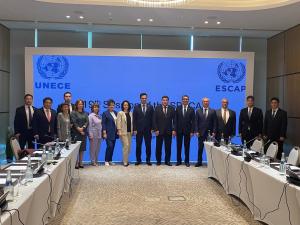Increasing the use of digital solutions including those developed by the United Nations Centre for Trade Facilitation and Electronic Business (UN/CEFACT) can enhance the sustainability and resilience of supply chains and strengthen global connectivity.
In a series of capacity-building activities, UNECE provided substantive support to facilitate trade and digitalize information flows in supply chains to participating states of the UN Special Programme for the Economies of Central Asia (SPECA), notably Uzbekistan, which is in the process of acceding to the WTO. As part of this process, UNECE provided support to government agencies and the business community to better understand the UN/CEFACT standards for digitalization of multimodal data and document exchange. At the same time, UNECE is supporting Uzbekistan to develop a National Trade Facilitation Roadmap, aimed to serve as the guiding framework for its trade facilitation reforms, building on years of cooperation in trade facilitation.
This is part of the implementation of the Roadmap for the digitalization of multimodal data and document exchange along the Trans-Caspian transport corridor, using United Nations legal instruments and standards prepared with support from UNECE and adopted by the Presidents of the SPECA participating States at their 2023 Summit.
Following Uzbekistan’s request for support, UNECE organized on 29 March 2024 in Tashkent a national capacity-building seminar on the use of UN/CEFACT standards to digitalize multimodal data and document exchange, working with the Ministry of Transport and the Ministry of Investment, Industry, and Trade of Uzbekistan, and bringing together representatives of Customs, the ministries of trade and transport and the business community. UNECE also organized a regional SPECA side event on 4 April 2024 jointly with the ministries of trade and transport to further address these issues at the Asia-Pacific Trade Facilitation Forum.
This cooperation seeks to address the fragmentation of efforts to digitalize parts of transport and supply chains along the Trans-Caspian Corridor and elsewhere in the region. The digitalization of data and document exchange is characterized by (a) different and often unharmonized efforts in the different modes of transport (rail, road, inland water, sea, or air); (b) different regulatory regimes (conventions), national or regional legislation; and (c) different technological syntaxes. Historically, this fragmentation has been an important factor giving rise to the inefficiency of the Trans-Caspian (or Middle) trade and transport corridor. The solution is not to offer ready-to-use, standard electronic document equivalents for consignment notes, bills of lading, and additional documents, but to offer common semantic-layer standards, such as those developed by UN/CEFACT.
The exchanges highlighted the importance of using UN standards in the digitalization of multimodal data and document exchange and requested a set of follow-up activities, notably:
-
intensified cooperation among countries and agencies on the use of UN standards for the digitalization of multimodal data and document exchange along supply chains,
-
increased involvement of international development partners to build technical skills in the region for implementing the UN/CEFACT standards, including through the establishment of centres of expertise (networks of experts) working on the use of the standards and digitalization of multimodal data and document exchange in the region,
-
finalize current and develop further pilot implementation projects, as requested by the SPECA participating States.
During the Asia-Pacific Trade Facilitation Forum (1-4 April 2024), working with the key regulatory agencies in Uzbekistan, UNECE supported Uzbekistan to progress towards the finalization ofits Trade Facilitation Roadmap. As part of this process, Uzbekistan has created several working groups, including on the implementation of the UN/CEFACT standards for multimodal data and document exchange. The conclusion of the drafting process is expected this summer. The Government intends to involve the WTO accession negotiation team in the validation of the Roadmap and to make it a stable foundation for the country’s continued sustainable development efforts.
In conjunction with the recently held 11th Asia-Pacific Trade Facilitation Forum, UNECE and its subsidiary body UN/CEFACT organized and contributed to a series of events, jointly with key partners including the Government of Azerbaijan, ESCAP, the Asian Development Bank, UNCTAD and ITC, among others. A key message conveyed during the Forum is the importance of coordinating digitalization efforts and supporting countries in expanding their access to regional and international markets using UN standards and tools.
According to the fifth United Nations Global Survey on Digital and Sustainable Trade Facilitation, progress has been observed in the region: 5.7 percent improvement in the period 2021-2023 for the whole UNECE region and 3 percent for the SPECA sub-region.1 While SPECA participating States are showing slow progress in the other areas of trade facilitation, they demonstrate a 7.54 percent improvement in cross-border paperless trade. The implementation rate for countries in the UNECE region reached overall 80 per cent, which is above the global average implementation rate of 68.7 per cent. While the implementation rate is highest for those measures that are included in the WTO TFA, implementation differs across the measures captured in the Survey.
UN/CEFACT Chair Ms. Sue Probert emphasized the centrality of UN/CEFACT standards to overcome the fragmentation of digitalization efforts and to foster sustainable, efficient, and transparent supply chains, as the world is moving towards sharing data, not documents, while ensuring interoperability in the information flows by implementing international standards.


